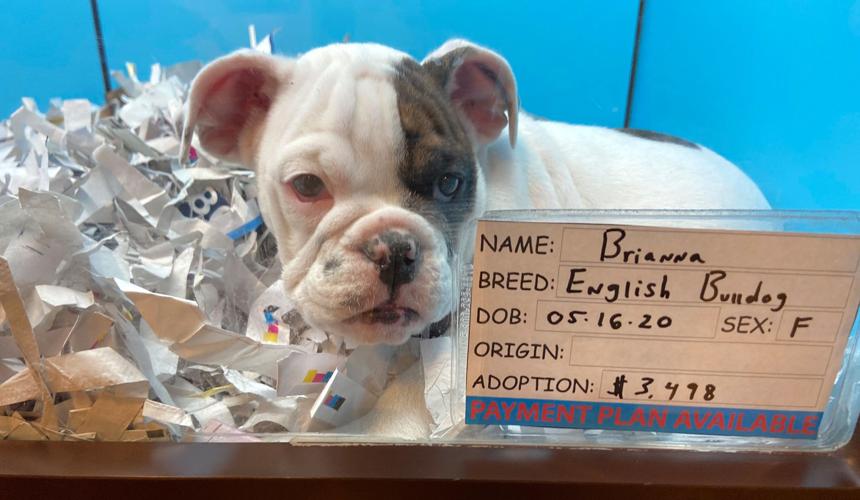The sign out front says Puppy World Rescue, but there’s not a rescue pet in sight at a new Tucson-area store already under investigation over complaints it’s misleading consumers and violating state law.
The only puppies on offer are purebreds — with “adoption” fees of up to $3,500 — in the store that recently opened at Tucson Premium Outlets in Marana, according to complaints filed with the town’s animal control office.
The store recently relocated from California after the owner was served in that state with a lawsuit that claims he’s part of puppy mill network — a claim he denies, public records show.
Puppy mills mass-produce pups on the cheap by sacrificing the health of mother dogs, who often spend their lives in cramped cages being bred every time they’re in heat, the Humane Society of the United States says.
The federal government is supposed to police the industry but seldom enforces animal welfare laws, critics say.
The industry is reportedly lucrative.
A pet store that buys a puppy mill pup for $500 can turn around and sell it for $5,000 or more depending on the breed and market location, according to national groups that monitor pet store sales.
“Almost all pet store puppies come from puppy mills,” the humane society said.
“False allegations”
The new Tucson store is owned by Rickie Gallardo, a 23-year-old promoter of get-rich-quick videos who claims he was “arrested numerous times for different crimes” before becoming a self-made millionaire at age 21.
Gallardo markets his financial prowess on multiple social media sites, posing with trappings of wealth such as high-end watches, $100 bills and an Italian luxury car. It isn’t clear where Gallardo lives now. His Facebook page says San Diego, but the lawsuit says Los Angeles County.
In an email interview with the Arizona Daily Star, Gallardo didn’t answer most of the questions he was asked but described the California lawsuit as “frivolous” and “based on completely false allegations.”
The puppies he sold in that state were “100% rescues,” he wrote.
He said he’s sorry if anyone in Tucson “felt misled’” because his new store sign advertises rescue pups that aren’t available. He said he intends to change his business name.
Asked where the puppies sold at his Tucson store are coming from, Gallardo did not reply.
Tucson is home to hundreds of animal welfare advocates who raise money, volunteer at pet shelters or foster homeless animals, so word of a new puppy rescue store spread fast — and raised eyebrows.
“Something wasn’t right”
“Rescue dogs are almost never purebred puppies,” said former state lawmaker Nancy Young Wright, now president of Rescue Me Tucson, a nonprofit working to establish a pet adoption center for use by local rescue groups.
Tucsonan Randy Willoughby, who volunteers for Harley’s Dream, a national group working to end puppy mills, said she noticed “something wasn’t right,” as soon as she entered the new outlet store.
Instead of rescues, she said, the cages held apparent purebreds with hefty “adoption” fees: $2,500 for a pug; $3,500 for an English bulldog; $2,800 for a Welsh corgi and $2,000 for a Chihuahua.
The puppies’ origins — the names and federal registration numbers of the breeders they came from — were not disclosed on any of the cages as required by state law, she said.
Overhead, big screen TVs flashed ads in English and Spanish offering financing for those who can’t pay the adoption fees upfront.
“They seemed to be targeting people who really couldn’t afford these dogs,” Willoughby said. “The whole thing just seemed very deceptive.”
She took photos and submitted a complaint a few days later to the town of Marana animal control department. A friend who was with her at the store did the same, she said.
Probe “ongoing”
Bill Lorefice, who oversees Marana animal control, wouldn’t say how many complaints the town has received so far, but said inspectors verified some of the concerns complainants raised.
The new store was violating at least two provisions of the state law on retail puppy sales, and was served notice to correct the deficiencies, Lorefice told the Star.
Puppy cages lacked required breeder disclosure information, he said, and the store also failed to display a copy of Arizona’s puppy lemon law, which tells buyers what their legal rights are if an animal gets sick or dies soon after purchase.
Asked if he knows where Gallardo’s puppies came from, Lorefice said he couldn’t comment because of the “open and ongoing investigation.”
He stressed his office can enforce only pet store laws. Complaints the store is misleading consumers by advertising nonexistent rescue pets would need to be examined by a law enforcement agency, he said.
“At this point there may be other jurisdictions, other law enforcement agencies, that could become involved,” he said.
Gallardo told the Star he intends to work closely with animal control to ensure his new store is complying with the law.
California lawsuit
The California lawsuit was filed in federal court in San Diego in March by a Maryland rescue organization that claims its longstanding good name is being tarnished by Gallardo and a dozen or so co-defendants.
He and other co-defendant pet store owners all used the same puppy supplier, a Missouri entity founded in 2018 with a name nearly identical to that of the Maryland rescue founded in 2005, the suit said.
The co-defendants have denied wrongdoing.
The suit claims the Missouri entity and the California pet store owners were operating a “puppy mill” network.
The defendants were “fraudulently labeling mass-produced puppies from commercial breeders in Missouri as ‘rescues,’ taking them from their mothers at eight weeks of age or younger and shipping them across the country by the truckload to be sold in pet stores across California,” the lawsuit claims.
It claims the alleged ruse was aimed at circumventing a 2019 California law that bans sales of commercially bred puppies and allows pet stores to sell only rescue animals.
By labeling puppy cages with a supplier name similar to the Maryland rescue group, pet stores gave the impression the pups came from the Maryland rescue group, the suit says.
The Maryland group said it’s had to divert its resources to deal with complaints from confused California puppy buyers who can’t tell the difference between the two like-named entities.
George R. Najjar, a San Diego lawyer who represents Gallardo and his co-defendants, tried and failed to get the case thrown out of court in June, court records show.
He also tried to get the judge to agree to remove unflattering words such as “fake” and “puppy mill’ from the text of the lawsuit. Again, he was rebuffed.
Najjar did not respond to the Star’s request for comment and instead forwarded the request to Gallardo.
Gallardo predicted he’ll prevail in court and said he looks forward to doing business at his new location.
“We are happy to be here in the great state of Arizona and we are even more delighted to see so many families full of joy with healthy, happy puppies,” he said.
A few of the things that happen on Tucson summer days.





